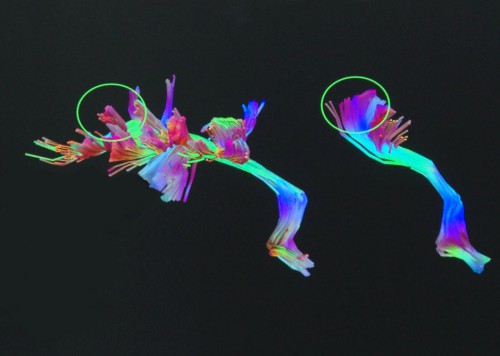30/09/2013
L'aube naissante...
Il y a quelques jours, j'écrivais;
"La douleur, la tristesse, la peine... est-ce pour ne pas sombrer que je mets cette distance entre ces émotions et ma capacité de les exprimer autrement que verbalement? Est-ce l'ultime rempart avant la chute?"
C'est en fait une des caractéristiques de l'autisme. Les émotions n'existent pas de la même façon dans nos esprits. Il faut savoir interprêter les sentiments et les sensations verbalisées ou manifestées non verbalement en lieu et place des émotions exprimées... émotivement!
Les connections neuronales se forment de façon très atypique chez les autistes, que ce soit sur le spectre "classique" ou de haut niveau.
Cela donne chez moi une façon de rester en permanence en contrôle invraissemblable, provoquant le doute et le scepticisme chez les gens qui ne me connaissent pas. (Même chez ceux qui me connaissent d'ailleurs... il faut avoir une vue d'ensemble de tellement de paramètres totalement dissimulés chez moi...).
Après mon diagnostique, j'ai bien sûr prévenu mes amis proches, ma famille, qui s'inquiétaient à la fois de connaître l'issue de ma démarche, et de mon état après l'annonce du diagnostique.
Je suis maintenant capable de parler plus précisément et plus efficacement (c'est à dire tout simplement me faire comprendre) grâce à ces quelques phrases très pertinentes que m'a adressé un des psychiatres, à savoir l'impossibilité pour mes interlocuteurs de se faire une idée réelement précise de ce que je vis par l'absence d'émotions dans mes propos. Enfin, si, des émotions paraissent, mais pas de façon émotive justement. Ce n'est pas de la simulation non plus, juste de l'interprêtation. Cela provoque chez certaines personnes de la gêne, un malaise parce que le non-verbal habituellement associé n'est pas présent.
J'ai remarqué dans une entrevue de Temple Grandin ce qui se passe exactement de la même façon chez moi; quand on lui pose des questions sur les émotions, son regard se perd dans le lointain, et elle patine pour tenter de répondre. Il m'est arrivé exactement la même chose lors de mon évaluation. C'est frappant maintenant pour moi. Cela a d'ailleurs frappé les psychiatres. C'est à mon sens très révélateur!
03:51 Publié dans Fantasme de fille | Lien permanent | Commentaires (4) | Tags : autisme, syndrome asperger, aspie
22/09/2013
Post-trauma shock
After a whole day thinking about all pros and cons of the situation, all the possibilities I will have from now on, I am desperately trying to put everything into perspective.
I was right since the age of 6. That very day I realised I was different. I had pinpointed "classic" autistic disorder on the autism spectrum and Asperger syndrom - yes, both of them - four years ago. I never really wanted to talk about it because it doesn't exist "in the books". I already couldn't get any attention toward the need I had to have any of them diagnosed.
I often thought I was just out of tracks and surely I was wrong because so many people told me so.
And then, after all these years, with no hesitation, both psychiatrists tell me that I was right. I am a hybrid they say... nothing found in the books.
Next day, I felt like I have been under a huge rock all my life, heavily weighing on my chest, crying for help, and people and professional passing by and saying; "ain't got nothing wrong..."
The psychiatrists removed the weight from my chest on Wednesday, but I still feel the pain and I have trouble to deal with the changing situation. I am confused, lost, still have pain, way less but still...
I must react. I wrote to my doctor calling for help. She was among the professionals that did not believe I could have the Asperger syndrom. But last year, she gave me a reference for exams regarding autism and Asperger syndrom. She still did not believe I could be on the spectrum, but she thought she had to make sure.

These are two scans of brains. The left one is Temple Grandin's, the right one is a neurotypical's brain.
(Temple Grandin is a famous Aspie. A neurotypical person is a so called "normal" person).
That is exactly how I can describe what's going on with me when over exposed to human interactions. Too many stimulations caused by human interactions. My mind just blow a fuse if the situation lasts for too long.
I have made a huge data collection and analysis over the years, and now that I am officially authorized to say that I am on the spectrum, I feel I have finally been granted the right to use these tools I developed without any shame or restriction.
I am now going to take you into my world... the world of autism.
02:54 Publié dans a retenir... | Lien permanent | Commentaires (0) | Tags : asperger syndrom, aspie, autism, high level autism






